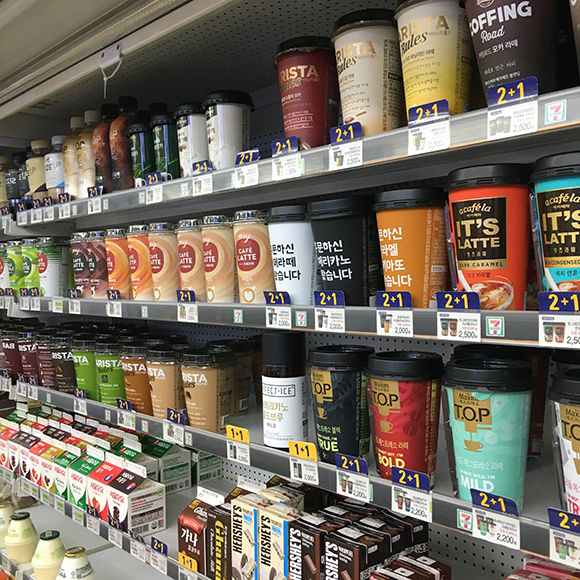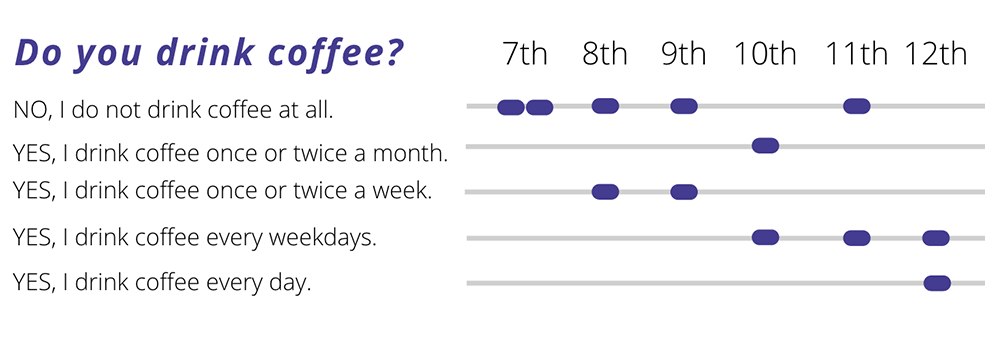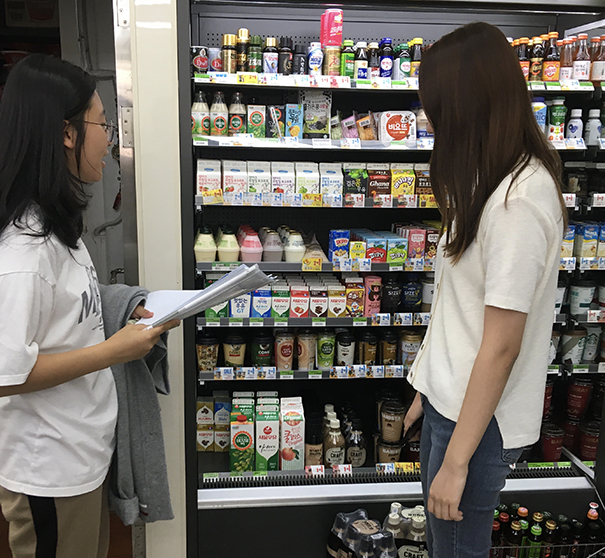Do you know what the world’s most widely used drug is? Many of you might have come up with answers such as tobacco or alcohol, but the answer is caffeine. Consumed over 100,000 metric tons every year, caffeine is closely tied with our daily life. Caffeine is included in daily foods such as chocolate, cake, tea, and coffee. Coffee plays a huge role in modern people’s lives; statistics shows that an average American spent $1,100 in buying coffee in 2018 according to the Acorns Money Matters Report. Adults, usually office workers, drink coffee to concentrate better on their tasks. Then, how about teenagers? Don’t students also have to concentrate on their homework and studying?
Even though a lot of people consume caffeine, they do not exactly know how caffeine works and affects our body. Caffeine helps us to stay alert, focused, and boosts productivity. It also puts people in a good mood and helps people to be energetic. Not only these short-term benefits, caffeine also has long-term benefits. According to an online lesson about caffeine by the TED-Ed educator Hanan Qasim, consuming caffeine can decrease the possibility of Parkinson’s disease, Alzheimer’s disease, and some cancers. All these benefits are possible because caffeine is a drug, specifically a stimulant for the central nervous system. Adenosine triphosphate, ATP for short, is an organic chemical that provides energy to body cells. When ATP is used, it releases a molecule called adenosine. In neurons, there are adenosine receptors that are perfectly tailored for adenosine to fit in. Since adenosine is a central nervous depressant, it makes our body sleepy and tired when it binds with the adenosine receptor. However, because caffeine has a similar molecular structure with adenosine, it can fit into the adenosine receptors before adenosine does and block our body from feeling drowsy even though when the body is overworked and needs to sleep. This is the basic mechanism of how caffeine works. (For additional information, refer to this TED-Ed lesson: https://ed.ted.com/lessons/how-does-caffeine-keep-us-awake-hanan-qasim#watch)

Caffeine looks like an ideal drug for people since it helps a person to work more than actually he or she can, doesn’t it? Yet, like every other good drug, caffeine also has its own disadvantages. Consuming caffeine can make the body’s blood pressure and heart rate higher, which leads to increased urination and diarrhea. When a large amount of caffeine is consumed every day, it disturbs the body’s sleeping habits and causes insomnia. Not only physically, but caffeine has psychological effect of making one sensitive and feel anxiety. These disadvantages can be prevented by consuming appropriate amount of caffeine every day. According to the American Food and Drug Administration, an average adult can handle 400 mg of caffeine every day, which is equivalent to 4 or 5 cups of coffee. Then, how about teenagers? To children who are below 12, a cup of coffee a day can be dangerous, which is about 100 mg of caffeine. For teenagers between 12 and 18, up to 100 mg of caffeine every day can be okay. However, this information doesn’t mean that teenagers can drink a cup of coffee every day since caffeine is also included in other foods teenagers might consume; 100 mg of caffeine is equivalent to two or three cans of soda, three Hershey’s special dark bar, two ice creams, and two or three cups of tea. (More information about caffeine including foods can be found in this article by the National Sleep Foundation: https://www.sleep.org/articles/foods-with-caffeine/) This means 100 mg of caffeine can be consumed every day by teenagers even though they do not drink a cup of coffee. However, teenagers who are wearing school uniforms buying or drinking coffee are easily spotted nowadays in South Korea. Therefore, I decided to survey our school’s secondary students about whether they drink coffee or not and the reason why they drink coffee.
Toward every 2 students from 7th grade to 12th grade, I asked 4 following questions: 1) Do you drink coffee? 2) How often do you drink coffee? 3) Do you know that drinking coffee, consuming caffeine in specific, can negatively affect you both physically and psychologically? 4) Even though you know the bad consequences, what is the main reason why you drink coffee? The result of the survey was shocking. Among 12 secondary students, 7 students answered that they drink coffee. This is 58%, obviously over half of the students. Students who drink coffee answered that they are fully aware of the disadvantages drinking coffee might bring, both physically and psychologically. For the frequency, 43% of them drink coffee every weekday, 28% of them drink coffee once or twice a week, 14% of them drink coffee every day, and 14% of them drink coffee once or twice a month. 43% of the students answered that when they drink coffee, they drink at least two or three cups. This means they are consuming 200 to 300 mg of caffeine at once, which is highly over the average amount of caffeine a teenager should consume.

For the reason why they drink coffee, 71% of them drink to stay awake, 14% of them drink because of the taste, and 14% of them drink because of the placebo effect. To have a better understanding of why they drink coffee, I interviewed a senior from my school, Irene Kim. She answered that she drinks coffee every day. “I first started to drink coffee because most of my peers did so, and now I cannot keep my eyes open if I do not drink coffee every day,” said Irene. If teenagers start drinking coffee at a young age, it is likely for them to become addicted or resistant to caffeine, causing them to drink even more and more. Irene mentioned that she knew the disadvantages of drinking coffee, yet she said it felt different and much more deadly when she directly experienced it. She said “Now, I have to dedicate more time to be asleep compared to when I didn’t drink coffee. I also have to use the restroom more often.” She also mentioned another disadvantage of drinking coffee, money. She said that herself and her friends consume about a quarter of their allowance in buying coffee in stores and cafes. “Most students drink coffee to reduce their sleeping hours and study for their exams or do their homework instead. If the number of work students receives from school and academy decreases, probably all teenagers will stop drinking coffee,” mentioned Irene.

Consuming caffeine has deadly consequences, and these consequences are even worse for teenagers since their immature body is more sensitive toward different substances, according to the Michigan Medicine. After conducting a survey toward our school students, I figured out that more than half of the students consume coffee due to the heavy burden of studying, knowing the negative effects of caffeine. The image of coffee made by media and peers drinking coffee induces teenagers to start drinking coffee. In order to prevent teenagers from start drinking coffee, students should be free from homework and school work. However, if they are in a situation where they have to study a lot, students should try to effectively schedule their day and use their time wisely, not reducing sleeping hours. I also suggest that if there is a short slogan about the danger of teenager’s caffeine consume in cafes or coffee aisle of convenient stores, the number of teenagers who start drinking coffee from a young age will decrease. Taking advantage of caffeine isn’t always the best way to stay awake. Students should try to figure out another solution by discussing with their parents or teachers rather than just simply drinking coffee.

Moonyoung (Rosy) Bang
Grade 10
Gangnam International School (GIS)

